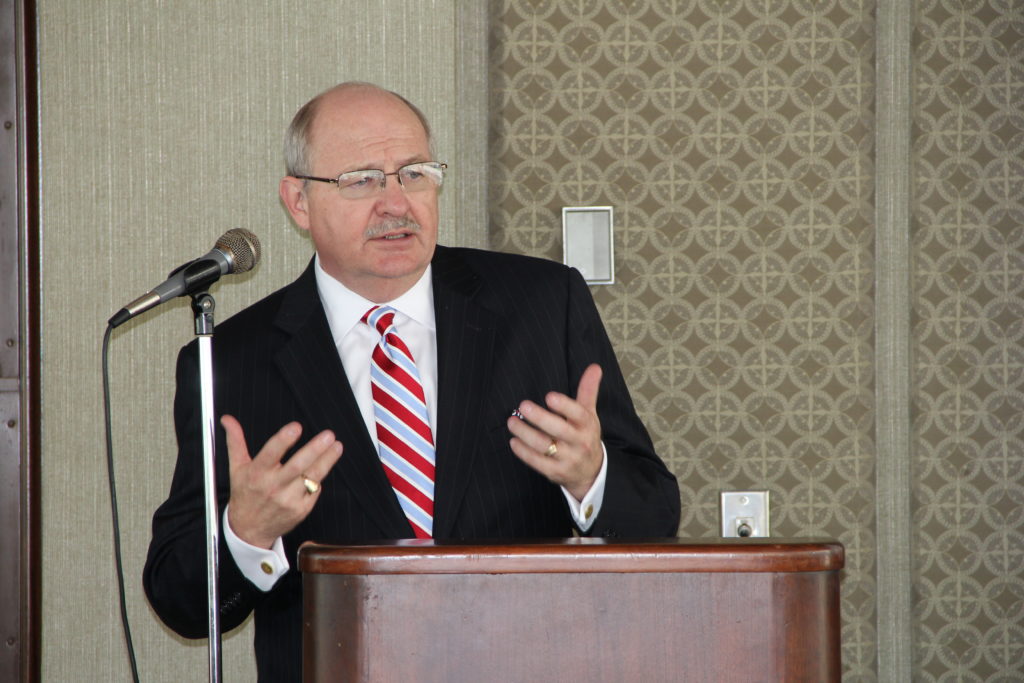
Dr. Don Williamson has been the president/CEO of the Alabama Hospital Association since November 2015. Previously, he was well known to Alabamians for his work in the Alabama Department of Public Health for 29 years, serving as State Health Officer and director of the Department for the last 23 years.
A native of rural Mississippi, he received his medical degree from the University of Mississippi and completed training in internal medicine at the University of Virginia. Since the pandemic, he and his staff have been working remotely, but he continues to be a familiar face on newscasts advocating on behalf of Alabama’s 114 hospitals and 300,000 healthcare workers. He spoke to us in December when the pandemic was surging and pushing hospitals nationwide to the brink. – Lenore Vickrey
How did you end up in the field of medicine?
My mom taught freshman English and my dad taught science. I love literature, but I figured out, you are really never going to be hugely financially successful as a literature professor if you aren’t also a creative writer. I’m not a particularly creative writer, and I didn’t see the great American novel in my future, so I looked at my skill set. I had the good fortune to enjoy math and sciences. And I really enjoyed physiology and biochemistry. The place where those really come together is in medicine. I found I really like taking care of sick people, so I ended up in internal medicine. Through a weird set of circumstances, I then ended up in public health. A physician has a patient, and in my role, my patient was the state of Alabama.
You spent 23 years as the state’s health officer. What were some of the biggest challenges during those years?
Obviously the huge challenge in public health is always funding. There’s never enough money to do public health the way you want. Our payment system is geared to treating individuals who are ill, and not geared to preventing individuals from becoming ill. We did do a couple things that I hope will stand the test of time, such as the Child Health Insurance Program (now known as All Kids). At the time we had over 20 percent of children who were uninsured. We got that down to three percent. We were also able to build 50 county health departments. We created an infrastructure for those counties to have health departments without putting a burden on the state. I also got to help out with Medicaid. In between, we did H1N1 in 2008-2009.
How has your present job been different?
It’s given me an opportunity to see the healthcare system from a different perspective. It’s allowed me to be more vocal on issues. Medicaid expansion is a classic example. Clearly Medicaid expansion is the right thing to do. It’s financially the right thing to do. When you expand Medicaid, credit scores go up. I will continue to advocate for that. Unfortunately, COVID came along and took over all the conversations.
How has the pandemic affected our rural hospitals?
Before the pandemic, our rural hospitals were losing 12.6% per year. Eighty-seven percent were operating in the red. We are very grateful for CARES money, but that money has not made up any losses. COVID could be a crisis that leads to closure of a number of our rural hospitals.
Are we going to see universal health care coverage? If so, they may do better. Are we going to see a consolidation of health care systems? If so, some of those hospitals may transform into something else other than a hospital. We don’t know at this point. This is going to evolve over the next year. If we expand Medicaid, that would really help.
Because we didn’t expand Medicaid, roughly 15% of 19- to 64-year-olds are uninsured. Uninsured populations are higher in rural areas. Rural populations are older. Because of that, they have a higher Medicare payer rate. Medicare reimburses less in rural Alabama than anywhere else in the country. On top of that, in rural Alabama, you have more Medicaid, more Medicare, more uninsured, less third-party payers like Blue Cross Blue Shield.
Did any of those challenges prepare you for dealing with what has become the most significant health crisis in our lifetimes?
It’s clearly the defining moment for healthcare in this country. We are likely to deal with the consequences of COVID well into late spring. Whether you’re dealing with hospitals or as a state health officer, it’s all about reducing transmission. Understanding that helps immensely.
We don’t need more patients in the hospital with COVID. By reinforcing the public health message, we can keep hospitals from being overwhelmed, so it’s a very nice marriage of my previous experience with my current responsibilities.
How do you envision Alabama’s hospitals a year from now?
We don’t know how the health care system is going to look. COVID is one of those watershed events in American history. We will retrospectively date a lot of changes that occur in society to COVID. It has fundamentally taken people who were economically comfortable and taken away their livelihood. It has stressed our healthcare system in ways it has never been stressed before. The problem with our uninsured has been heightened. I do think you can predict we are going to see greater emphasis on eliminating the problem of uninsurance.
How have you and your family been coping during the pandemic?
We are hard believers in forced quarantine. We don’t go out unless we absolutely have to. We wear masks. We minimize any interaction in public. While 6 feet is a minimum safe distance, I prefer 20 feet.




